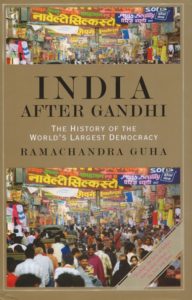“India After Gandhi” by Ramachandra Guha
 I’ve been wanting to learn more about history for a long time now, and I’ve finally decided to take the plunge and start reading more history books. I started off with a book I’ve owned for about eight years now, but never got around to reading. I think I’ve been avoiding non-fiction because it takes me much longer to read and comprehend it, but I guess I should stop judging my reading by total number of books read.
I’ve been wanting to learn more about history for a long time now, and I’ve finally decided to take the plunge and start reading more history books. I started off with a book I’ve owned for about eight years now, but never got around to reading. I think I’ve been avoiding non-fiction because it takes me much longer to read and comprehend it, but I guess I should stop judging my reading by total number of books read.
India After Gandhi is a post-independence history of India; a subject I didn’t know a lot about, despite spending the first seventeen years of my life there. In school, our history books pretty much stopped at independence. It starts off with the Partition and the formation of the Indian government, and goes until 2007 (when the book was written), although the final two decades are not covered with the same level of historical detail (due to the events being too contemporary.)
The book is extremely comprehensive, Guha clearly did a lot of research – the bibliography is humongous. It covered the process of transitioning from British rule (highlighting administrative problems like integrating over 550 kingdoms into India, setting up free and fair elections for a largely illiterate electorate, and settling millions of refugees from Partition), subsequent politics, economic policy, social movements, and there’s even a chapter on popular entertainments. I learned a lot, I’m certainly a long way away from knowing all that I want to know about Indian history, but I feel like I have a solid foundation on which to build on, and I wouldn’t have thought one book would have been able to do that. It also gave me the historical context to understand several things I’d been confused about when I lived in India (like the history of the political parties and how they came to have the positions they did, and how the Indian states came to be organized in their current configuration.)
Guha does an admirable job of approaching things from a historian’s point of view, you can see that he has his own opinions as an Indian citizen, but he makes it pretty obvious that they are his own opinions when they crop up. I’m sure there are biases in what he chose to talk about and how he presented it, but those are unavoidable. My only complaint on that front was that Guha chooses to emphasize India’s successes, but doesn’t spend as much time talking about India’s failures. It’s not like he doesn’t acknowledge them, but because he doesn’t give them as much detail, they come across as relatively unimportant. For example, at one point he mentions that an election would be the first “free and fair” election in Kashmir, but all the talk of previous elections in the book so far had been about the heroic efforts of India’s Election Commission to set up elections that actually worked, so how did the Kashmir elections end up unfair?
Overall, I thought that this was a great book, and I’d recommend it to anyone looking to learn more about India. It did make me very sad, though – seeing India start out with such well-intentioned and smart leaders and devolve into the mess that it is now.

Pingback: “A World at Arms” by Gerhard Weinberg | Just a World Away
Pingback: “Mayflower: A Story of Courage, Community, and War” by Nathaniel Philbrick | Just a World Away